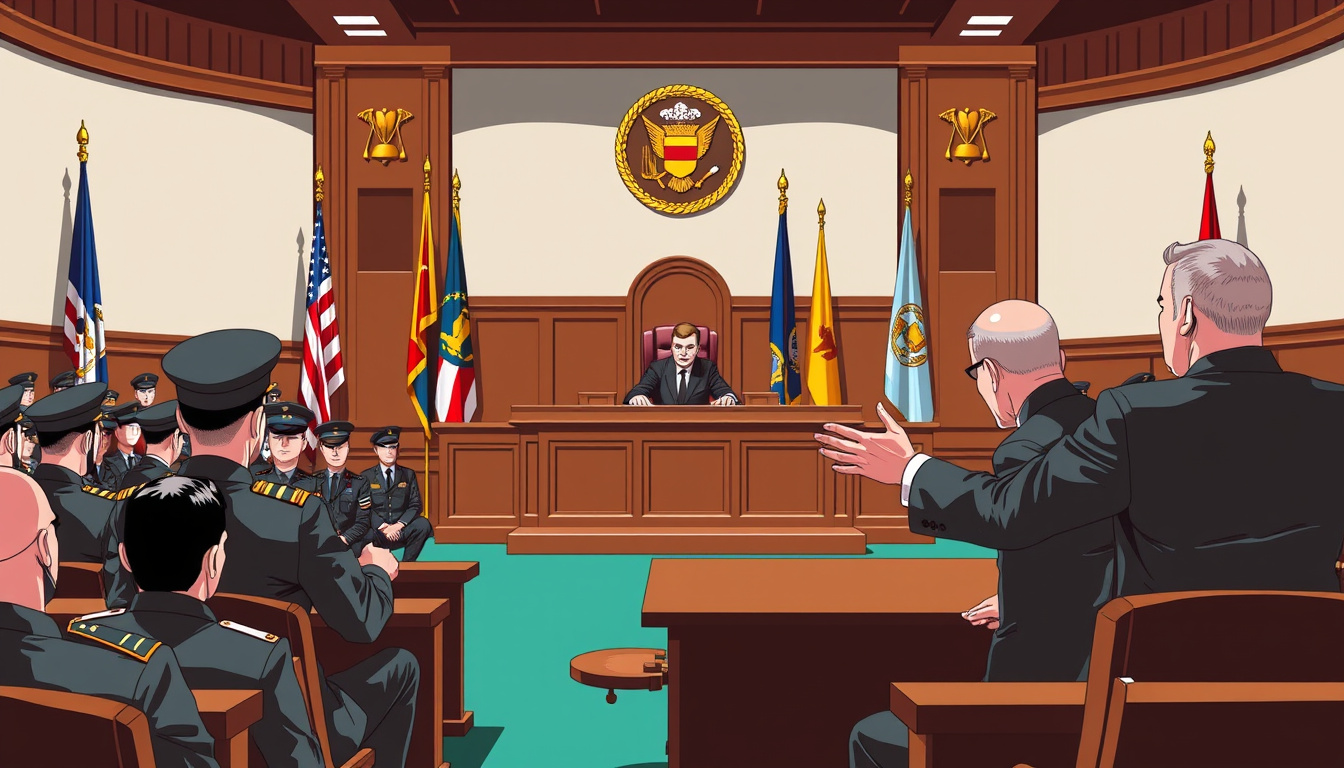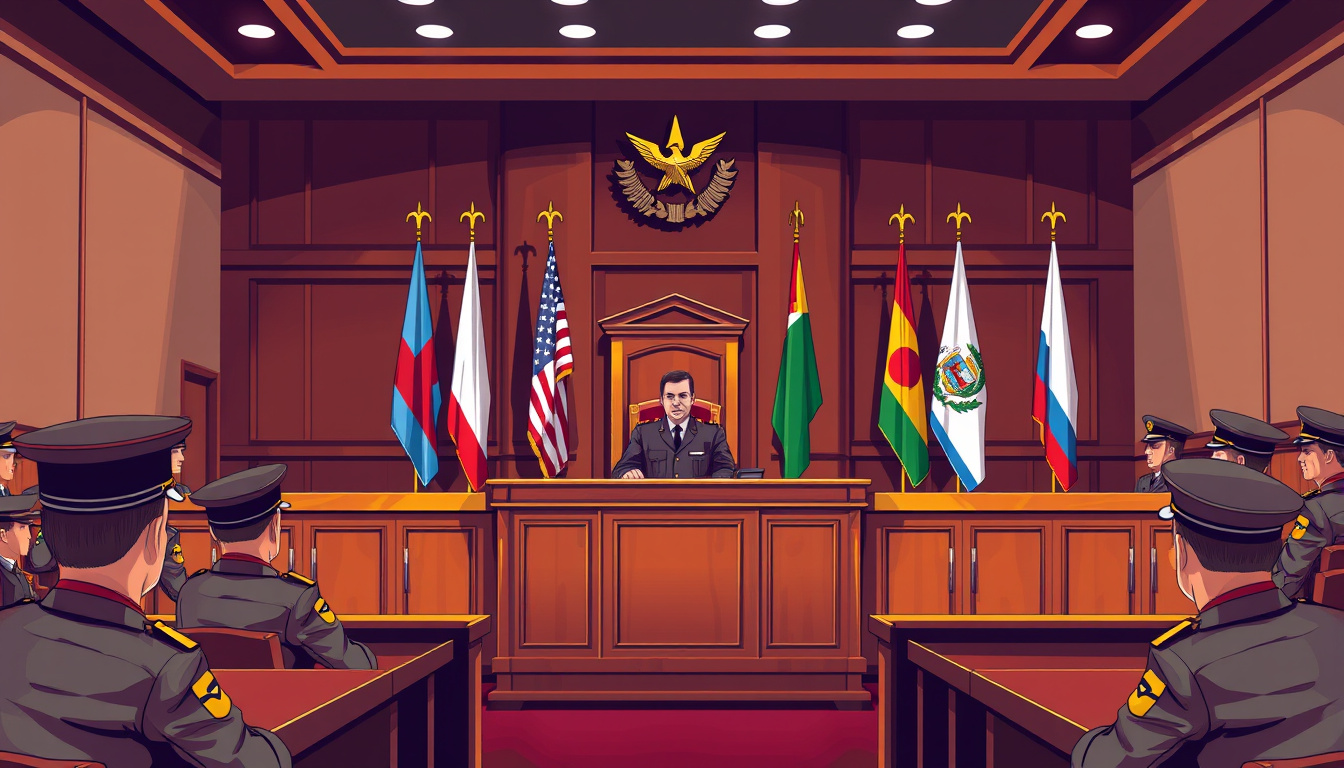When military servicemembers face allegations under Article 120c of the Uniform Code of Military Justice (UCMJ), they enter a daunting world of legal complexities.
Article 120c specifically addresses sexual assault offenses, which carry significant repercussions for those accused and the broader military community.
In this blog post, we will explore the definition and scope of sexual assault under Article 120c UCMJ, the legal framework and penalties involved, the differences between Article 120 and Article 120c, the rights of both the accused and accuser, the investigative procedures for claims under Article 120c, and recent case studies that illuminate the implications for military justice.
This comprehensive overview aims to provide clarity and support for military servicemembers and their families facing these serious matters.

Key Takeaways
- Article 120c UCMJ specifically addresses sexual assault within the military justice system.
- The definition of sexual assault under Article 120c includes a range of nonconsensual acts and behaviors.
- Penalties for violations of Article 120c can include court-martial and significant prison time, reflecting the seriousness of the offense.
- Differences between Article 120 and Article 120c include the specific types of conduct covered and their respective legal implications.
- The rights of both the accused and the accuser are crucial in maintaining fairness throughout the investigative process under Article 120c.
Introduction to Article 120c UCMJ
## Introduction to Article 120c UCMJ
Navigating the complexities of military law can be daunting, particularly when facing allegations under the Uniform Code of Military Justice (UCMJ).
Among the various articles under the UCMJ, Article 120c specifically addresses offenses related to sexual conduct, focusing on what is termed ‘wrongful sexual conduct.’ Understanding Article 120c UCMJ is crucial for servicemembers and their families who find themselves entangled in legal challenges involving sexual offenses.
This article aims to demystify the provisions of Article 120c UCMJ, clarifying its implications for those accused, their legal rights, and the potential repercussions of a conviction.
As servicemembers face a unique legal terrain, being well-informed about Article 120c UCMJ can help in navigating the complexities of military justice.
Definition and Scope of Sexual Assault Under Article 120c
### Definition and Scope of Sexual Assault Under Article 120c
Article 120c of the Uniform Code of Military Justice (UCMJ) specifically addresses the offenses of sexual assault within the military.
It was revised as part of the broader changes aimed at improving the handling of sexual offenses and protecting victims in military proceedings.
Under this article, sexual assault is defined as the intentional sexual conduct that occurs without the consent of the victim.
The law outlines clear definitions and categories of acts considered as sexual assault, which include various forms of sexual contact and behavior that violate consent standards.
Notably, Article 120c emphasizes the importance of consent, which means that engaging in sexual conduct without an explicit and voluntary agreement from all parties is deemed a criminal act.
This article not only applies to service members but also extends to civilian employees and other individuals affiliated with the military.
Understanding the scope of Article 120c UCMJ is crucial for military servicemembers and their families, as accusations or charges under this article can lead to serious administrative actions and even court-martial.
The repercussions of such charges can affect military careers profoundly, impacting promotions, benefits, and overall standing within the military community.
‘Justice delayed is justice denied.’ – William E. Gladstone

Legal Framework and Penalties
The military justice system is guided by the Uniform Code of Military Justice (UCMJ), which encompasses various articles outlining offenses and penalties applicable to military servicemembers.
One significant article that frequently arises in cases involving sexual offenses is Article 120c, UCMJ.
This article specifically addresses wrongful sexual contact and defines the unlawful conduct involving a variety of sexual acts without consent.
Servicemembers accused of violating Article 120c can face severe consequences, including court martial, which can lead to imprisonment, reduction in rank, and dishonorable discharge.
Understanding the legal framework surrounding Article 120c is critical for servicemembers and their families, as it directly impacts the rights of the accused and the nature of the defense required.
The penalties associated with Article 120c reflect the military’s commitment to maintaining discipline and order, emphasizing the serious nature of sexual offenses and the potential ramifications for both the accused and the military community at large.
Navigating the complexities of these legal proceedings necessitates a comprehensive understanding of the UCMJ and the importance of securing competent legal representation.
Differences Between Article 120 and Article 120c
When navigating the complexities of military law, understanding the specific Articles of the Uniform Code of Military Justice (UCMJ) relevant to sexual offenses is crucial.
Among these, Article 120 and Article 120c UCMJ often come into discussion.
Article 120 primarily addresses sexual assault offenses, encompassing a range of actions from rape to abusive sexual contact.
It was significantly revised in 2016 to address contemporary issues surrounding consent and to better protect victims of sexual assault within the military.
On the other hand, Article 120c UCMJ specifically pertains to the offense of committing a sexual act with a person who is incapable of consenting due to factors such as age or mental incapacity.
While both Articles focus on sexual misconduct, the fundamental difference lies in the legal definitions of consent and victim status.
Understanding the differences between Article 120 and Article 120c UCMJ is not only essential for servicemembers facing allegations or charges related to these articles but also critical for their families who may be supporting them during such challenging times.
Familiarizing oneself with these distinctions can lead to better informed legal decisions and a more comprehensive strategy in defense.

Rights of the Accused and the Accuser
When navigating the complex landscape of military justice, particularly when facing charges related to Article 120c of the UCMJ (Uniform Code of Military Justice), it is critical for both the accused and the accuser to understand their rights.
Article 120c specifically addresses wrongful sexual contact and is one of the serious offenses under military law.
For servicemembers—whether they are facing court martial proceedings or administrative separation—the rights afforded to them during such proceedings are crucial for ensuring a fair process.
For the accused, rights include the presumption of innocence until proven guilty, the right to be informed of the charges against them, and the right to representation.
It is vital that the accused fully understand these rights, as they can influence the outcome of their case significantly.
Additionally, the accused has the right to testify in their own defense and to call witnesses on their behalf, all of which are essential for presenting a comprehensive defense against the allegations.
On the other hand, for the accuser, their rights also include the right to be treated with dignity and respect throughout the process.
They have the right to report the incident and receive support, as well as the right to participate in the proceedings if they wish to make their voice heard.
Importantly, both parties are entitled to a fair investigation without bias, which is crucial for maintaining the integrity of the military justice system.
An understanding of these rights not only helps protect individuals involved but also underpins the principles of justice within the military context.
Procedures in Investigating Claims Under Article 120c
## Procedures in Investigating Claims Under Article 120c
When military servicemembers are accused of offenses related to sexual misconduct, particularly those aligned with Article 120c of the Uniform Code of Military Justice (UCMJ), it can lead to serious consequences.
Article 120c addresses offenses such as wrongful sexual contact and is designed to protect the integrity and safety of military personnel.
The procedures in investigating claims under Article 120c UCMJ are vital for both the accuser and the accused, and understanding them is crucial for servicemembers and their families.
The investigation typically begins with the reporting of the incident, where the alleged victim may contact their chain of command, a designated Sexual Assault Response Coordinator (SARC), or law enforcement.
Once a claim is filed, the military must promptly initiate a thorough investigation to ensure fairness and transparency.
This often involves collecting evidence, interviewing witnesses, and obtaining statements from both the accuser and the accused.
In cases involving Article 120c UCMJ, it’s crucial that the investigation follows the procedural guidelines laid out in military law to protect both parties’ rights.
The rules for evidence and inquiry differ from civilian procedures, often requiring specialized knowledge in military regulations.
As investigations proceed, they may lead to non-judicial punishment or a court-martial, depending on the severity of the allegations and the findings of the investigative body.
Servicemembers faced with allegations under Article 120c should seek legal counsel experienced in military law to navigate these complex procedures.
Understanding the nature of the claims, the defense options available, and the implications of the eventual outcome are all critical elements in addressing the issues that can arise from Article 120c UCMJ charges.
This proactive approach not only helps to ensure a just process but also safeguards the rights and futures of the servicemember involved.

Recent Case Studies and Implications for Military Justice
### Recent Case Studies and Implications for Military Justice
Understanding the complexities of military law is imperative for servicemembers and their families, particularly when facing serious allegations.
One significant provision of the Uniform Code of Military Justice (UCMJ) is Article 120c, which addresses sexual conduct and its ramifications.
Recent case studies have highlighted various interpretations and applications of Article 120c UCMJ, illustrating the potential consequences for both the accused and the military environment.
For instance, the high-profile case of a servicemember accused under Article 120c raised questions about consent and the evidentiary requirements for proving guilt.
The court’s ruling emphasized that the prosecution must establish beyond a reasonable doubt that the act was not consensual, underscoring the critical balance that must be maintained in military justice.
This case not only showcased the rigorous standards expected in military courts but also brought to light the ongoing challenges related to sexual assault and harassment within military ranks.
The implications of these cases extend beyond legal outcomes.
They affect unit cohesion, morale, and the overall perception of justice within the military community.
For families, the emotional toll of navigating such crises can be profound, magnifying the need for both legal guidance and emotional support.
As military spouses and family members often bear the brunt of the fallout from such accusations, understanding the specifics of Article 120c UCMJ, including potential defenses and the appeals process, can empower them to support their loved ones effectively.
Moreover, the evolving nature of military law necessitates that servicemembers remain vigilant about their rights and the resources available to them, particularly during administration separation or disciplinary action.
Frequently Asked Questions
What does Article 120c of the UCMJ cover?
Article 120c of the UCMJ specifically addresses sexual assault offenses involving consent, defining the circumstances under which consent can be considered valid or invalid, and outlining the legal implications of sexual conduct involving service members.
How does Article 120c differ from Article 120?
While Article 120 deals with various forms of sexual offenses including rape and sexual assault, Article 120c focuses specifically on sexual conduct that occurs without the valid consent of the victim, emphasizing the nuances of consent and related legal parameters.
What are the potential penalties for violating Article 120c?
Penalties for offenses under Article 120c can vary significantly, potentially including confinement, reduction in rank, forfeiture of pay, or dishonorable discharge, depending on the severity of the violation and the circumstances surrounding the case.
What rights do the accused have under Article 120c proceedings?
The accused have several rights, including the right to legal counsel, the right to a fair and impartial trial, and the right to present evidence and witnesses in their defense during military justice proceedings.
How are allegations under Article 120c investigated?
Claims under Article 120c are typically investigated by military law enforcement, following a defined protocol that may include interviewing witnesses, collecting evidence, and reviewing documentation related to the incident, while ensuring adherence to procedural fairness.
If you or a loved one is under investigation or facing charges under the UCMJ, don’t wait to protect your future. Contact Gonzalez & Waddington, Attorneys at Law. Our battle-tested military defense lawyers have successfully defended service members worldwide against the most serious military offenses. Call us today for a confidential consultation and put our elite military defense attorneys in your corner.
Related Posts
- Battlemind Legal Thriller Examines US Torture Program
- Protect the victim:
- Video: Borderline Personality Disorder False Military Sexual Assault Accusations
- Video: Creech AFB Military Defense Lawyers – Nevada Court Martial Attorneys – Article 120 UCMJ
- Video: Buchel AB Germany Military Defense Attorneys – Article 120 UCMJ Court Martial Lawyers
- Video: Aberdeen Proving Ground Court Martial Attorneys – Article 120 UCMJ Military Defense Lawyers
- How to Pay for a Civilian Military Defense Lawyer
- Pattern Cross-Examination of Expert Witnesses: Cross-Examination Examples
